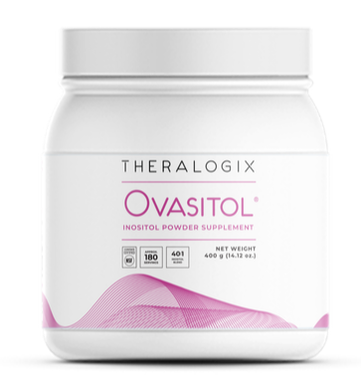PCOS Nutrition and Lifestyle
The first step to improving your hormones with PCOS is making a healthy lifestyle a priority. The good news is, lifestyle is actually something you can control! Nutrition, exercise, supplements, sleep, and stress management are the core factors of reducing PCOS symptoms and regulating hormones naturally.
Nutrition
Diet changes will help control insulin levels, blood sugar, and fat storage, which in turn regulate PCOS hormone levels. Overall, a balance of protein, fat, carbohydrates, and fiber is the goal.
Excess carbohydrate consumption (too many sugars and starches) results in excess insulin release and promotes fat storage. Even if you are not trying to lose weight, it is necessary to control carbohydrates in order to regulate PCOS hormones. This doesn't mean you need an extremely low carbohydrate diet, it just means you need to improve the quality of your carbohydrate intake and control the portion size . For example, may women with PCOS can only tolerate about 1/2 a cup of starch at each meal - that's not much! Additionally, it is imperative that you do not graze or snack all day long since this will result in increased insulin levels and fat storage.
What about gluten? Limiting gluten intake without a true sensitivity is controversial in the medical community. A gluten free diet is not required for PCOS management, however, it can be done in a safe way. Limiting gluten may help reduce PCOS symptoms, as gluten may aggravate inflammation in some people. PCOS and insulin resistance are inflammatory conditions, so it would be reasonable to avoid gluten. Gluten is a protein found in wheat, barley, and rye. Many processed foods may contain these ingredients as well. Check food labels for these ingredients and avoid them, if desired. Stick to whole foods that are minimally processed and cook most of your food yourself. All vegetables, fruits, beans, nuts, seeds, rice, potatoes, corn, oils, meats, and fish are naturally gluten free.
Need more specific meal examples? No worries, download our free one-week PCOS meal plan below or sign up for personalized nutrition coaching.
Excess carbohydrate consumption (too many sugars and starches) results in excess insulin release and promotes fat storage. Even if you are not trying to lose weight, it is necessary to control carbohydrates in order to regulate PCOS hormones. This doesn't mean you need an extremely low carbohydrate diet, it just means you need to improve the quality of your carbohydrate intake and control the portion size . For example, may women with PCOS can only tolerate about 1/2 a cup of starch at each meal - that's not much! Additionally, it is imperative that you do not graze or snack all day long since this will result in increased insulin levels and fat storage.
What about gluten? Limiting gluten intake without a true sensitivity is controversial in the medical community. A gluten free diet is not required for PCOS management, however, it can be done in a safe way. Limiting gluten may help reduce PCOS symptoms, as gluten may aggravate inflammation in some people. PCOS and insulin resistance are inflammatory conditions, so it would be reasonable to avoid gluten. Gluten is a protein found in wheat, barley, and rye. Many processed foods may contain these ingredients as well. Check food labels for these ingredients and avoid them, if desired. Stick to whole foods that are minimally processed and cook most of your food yourself. All vegetables, fruits, beans, nuts, seeds, rice, potatoes, corn, oils, meats, and fish are naturally gluten free.
Need more specific meal examples? No worries, download our free one-week PCOS meal plan below or sign up for personalized nutrition coaching.
Would you like a free PCOS meal plan emailed to you?
Exercise
Getting enough physical activity can be really difficult in the modern world! Unfortunately, for optimal hormone regulation, exercise is not optional.
There are two main guidelines for exercise: cardiovascular and resistance. Each week, make sure you get at least:
There are two main guidelines for exercise: cardiovascular and resistance. Each week, make sure you get at least:
- 150 minutes of moderate intensity physical activity. This equates to 30 minutes five days a week OR 50 minutes three days a week. Moderate intensity is more than a leisurely walk. Aim for at least a brisk walk, a jog, biking, swimming, or some other activity that you enjoy.
- Two sessions of resistance or weight-bearing exercise. You don't necessarily need special equipment! Body weight exercises such as lunges, squats, and push-ups are perfect! A challenging yoga class could also count!
Supplements

Scientific studies have shown that certain nutritional supplements help regulate PCOS symptoms!
Ovasitol is a natural inositol supplement shown to improve ovarian function and ovulation. It improves insulin sensitivity and reduces triglyceride levels.
Inositol is a naturally occurring vitamin-like substance that's found in some fruits and vegetables.
Ovasitol is unique because it was the first supplement to combine myo-inositol with D-chiro-inositol in the most effective ratio (40:1). This is why it is in powder form - take 1 packet and mix it with 6 oz of water twice daily (one in the morning and one in the evening. Ovasitol is tasteless and odorless.
Ovasitol is only available from health care professionals affiliated with Theralogix. Nourish PCOS has been affiliated with Theralogix since 2015. Safety is very important to us. That's why we only recommend products that are NSF verified and have scientific studies to show validity.
| |||||||
Sleep
Did you know that sleep actually helps regulate hormones? Sometimes we forget how important it can be for rest, recovery, and normal bodily functions!
- Sleep 7-8 hours every night. If you have trouble sleeping, focus on relaxing all of your muscles and don't look at any electronic screens (yep, even your phone) for 1 hour before bedtime.
- Make sure your bedroom is dark. Use blackout curtains if necessary.
- Stop worrying while in bed. Clear your mind so you can fall asleep. If you can't seem to clear your mind, imagine a blue sky. If other thoughts try to creep into your mind, force them out and continue to focus on the image of a blue sky.
- Keep your sleep schedule consistent, even on the weekends. Try not to change it by more than an hour.
Stress Reduction
|
Stress releases hormones, such as cortisol, that tell your body to increase blood sugar levels and suppress the immune system. Use these relaxation techniques to keep stress levels manageable.
|
Healthy at Every Size
We value health at every size and know that we can improve PCOS symptoms without a weight-centric approach. By working on health outcomes first, weight sometimes changes, and sometimes it doesn't. Many of the bothersome PCOS symptoms like excess hair growth, high testosterone levels, infertility resolve with lifestyle changes. Making these changes with PCOS can be difficult but it's not impossible with professional help! Make sure you use our nutrition and exercise tips and work with Lisa, our registered dietitian nutritionist and certified diabetes educator.

